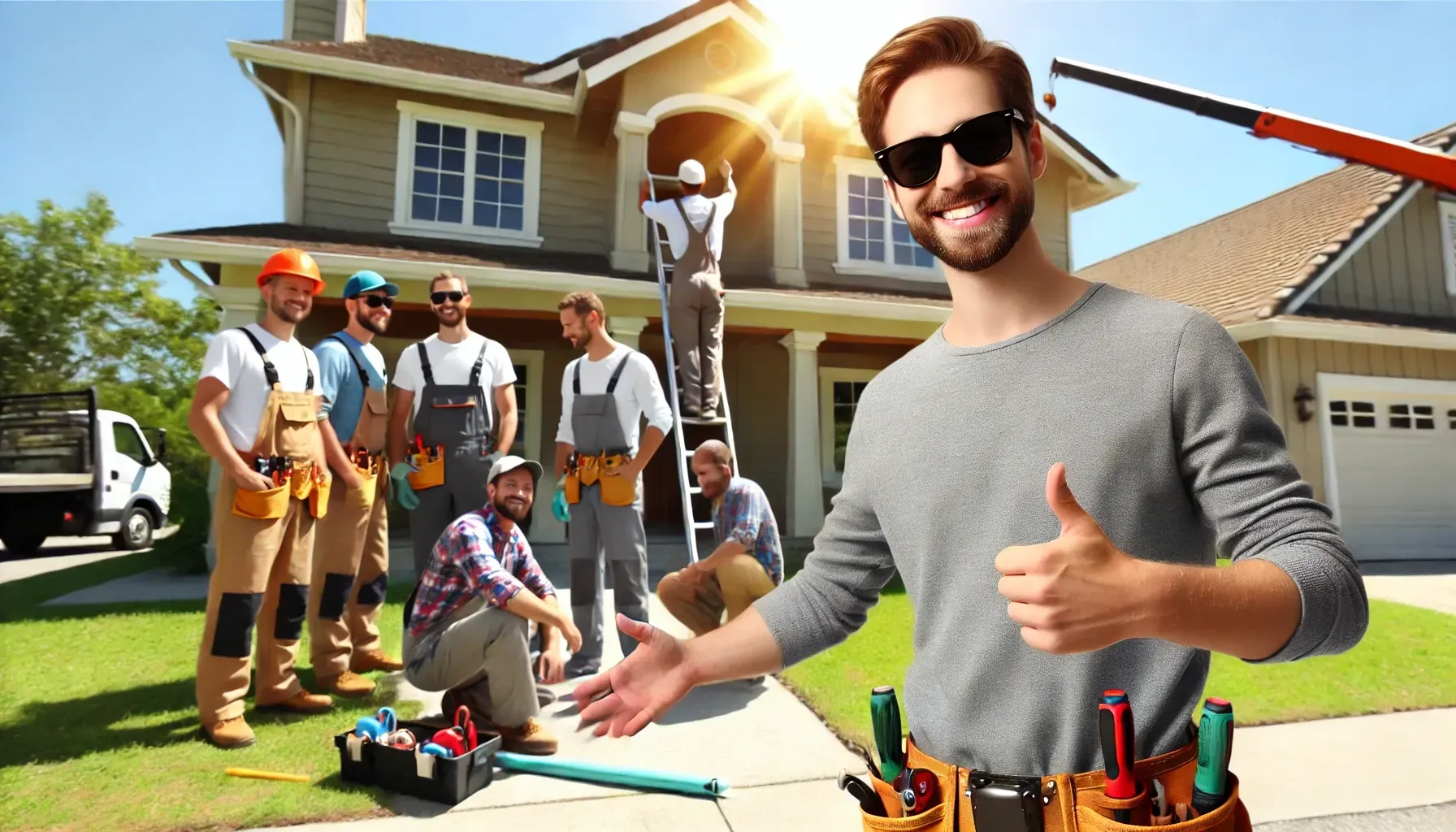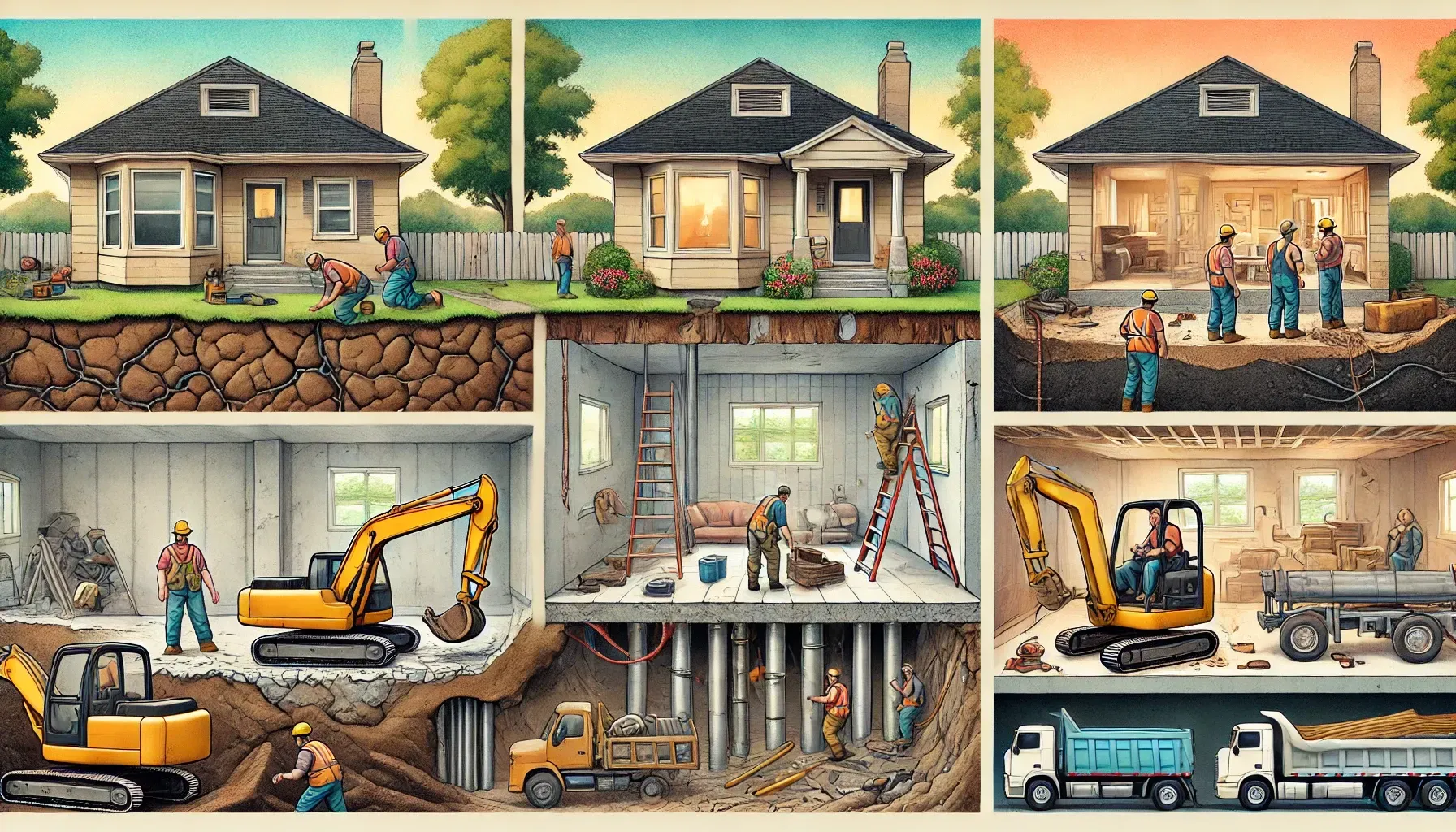Average Foundation Repair Costs: What to Expect
Breaking Down Foundation Repair Costs: What Every Homeowner Needs to Know
Ah, foundations. They’re the unsung heroes of our homes, the literal and metaphorical bedrock of everything we hold dear.
But what happens when cracks start showing, literally?
That’s when you dive into the murky waters of foundation repair costs, armed with a hearty mix of trepidation and curiosity.
Don’t worry; we’ve got your back (and your basement walls) as we break down the nitty-gritty of what to expect when repairing your foundation.
Why Foundations Matter (And Why They Break)
Your house’s foundation is like a relationship: strong, supportive, and built to weather storms. But just like any long-term commitment, it’s not immune to stress.
Soil erosion, water damage, and that extra room you added last year can all strain your foundation’s integrity.
Suddenly, you notice a crack in your basement wall that wasn’t there before. Maybe a door doesn’t close like it used to.
Congratulations, you’ve joined the exclusive club of people Googling things like “how much does a foundation repair cost” at midnight.
How Much Does Foundation Repair Cost?
The burning question on everyone’s mind: “How much does foundation repair cost?” The truth is, it depends.
Foundation repair costs can vary wildly based on the type of repair, the severity of the issue, and even the region you’re in. But don’t worry, we’re here to break it all down into bite-sized (and wallet-sized) chunks.
Cost Breakdown by Repair Type
- Basement Wall Crack Repair:
- Cost Range: $500–$2,500
- What It Covers: Sealing small to moderate cracks with epoxy or hydraulic cement to prevent water infiltration.
- Factors Affecting Cost: Size and location of the crack, accessibility, and whether water damage has already occurred.
- Slab Rectification (Slab Jacking):
- Cost Range: $500–$1,800
- What It Covers: Raising a sinking concrete slab by injecting grout beneath it. Ideal for minor settling issues.
- Factors Affecting Cost: Area of the slab, depth of sinking, and material used for the injection.
- Piering or Underpinning:
- Cost Range: $1,000–$3,000 per pier (average total: $5,000–$15,000)
- What It Covers: Installing steel or concrete piers to stabilize and lift a sinking foundation.
- Factors Affecting Cost: Number of piers required, type of pier used, and soil conditions.
- Foundation Waterproofing:
- Cost Range: $2,000–$7,000
- What It Covers: Applying waterproof coatings, installing French drains, or creating better exterior drainage to prevent water damage.
- Factors Affecting Cost: Size of the foundation, type of waterproofing system, and severity of water issues.
- Complete Foundation Replacement:
- Cost Range: $20,000–$50,000+
- What It Covers: Removing and replacing the entire foundation, often necessary for severe structural damage.
- Factors Affecting Cost: Size of the house, excavation needs, and complexity of the rebuild.
Factors Influencing Foundation Repair Costs
- Severity of Damage:
- Small hairline cracks are cheaper to fix than major structural issues like bowing walls or sinking foundations.
- Type of Foundation:
- Concrete Slab: Generally less expensive to repair than basement or crawl space foundations.
- Crawl Space: Repairs often require additional work like insulation or moisture barrier installation.
- Basement Foundation: More costly due to additional labor and materials.
- Soil Conditions:
- Areas with expansive clay soils (common in parts of Pennsylvania and New Jersey) may require more extensive repairs.
- Location:
- Costs can vary depending on local labor rates, permit requirements, and material availability.
- Water Damage:
- Water infiltration can lead to mold, rot, and structural weakening, adding significantly to repair costs.
Additional Costs to Consider
- Inspection Fees:
- A professional foundation inspection typically costs $300–$1,000. Some companies waive this fee if you hire them for repairs.
- Permits:
- Major foundation repairs may require building permits, which can cost $50–$500, depending on local regulations.
- Drainage Solutions:
- Fixing poor drainage might require installing gutters, downspouts, or exterior grading, adding $1,000–$5,000 to your total bill.
- Post-Repair Landscaping:
- Repairs that involve excavation can damage your yard, and re-landscaping could cost an additional $500–$2,500.
How to Save on Foundation Repairs
- Catch Problems Early: Address small issues before they become big, expensive headaches.
- Bundle Repairs: If you need multiple repairs (like crack sealing and waterproofing), ask about package discounts.
- Shop Around: Get at least three estimates, but don’t just go for the cheapest option because quality matters.
- Check Warranties: Reputable contractors often offer warranties on their work, which can save you money in the long run.
Why Investing in Foundation Repairs Is Worth It
While the upfront costs might seem high, foundation repairs are a long-term investment in your home’s safety and value. Ignoring foundation issues can lead to skyrocketing repair bills down the road, or worse, make your home unsafe to live in.
When it comes to foundation repair costs, it’s always better to act sooner rather than later. The peace of mind you’ll gain is priceless (but your foundation repair bill doesn’t have to be).
DIY vs. Professional Foundation Repair: A Comedy of Errors
Let’s dig deeper into the eternal question: Should you tackle foundation repair on your own or call in the pros? The choice might seem straightforward, but it’s not just about saving money, it’s about weighing risks, rewards, and your own capacity for chaos.
The DIY Route: Tools, Materials, and Time Commitment
DIY foundation repair is like fixing a leaky faucet. It sounds easy until you’re in the thick of it. Before you grab a trowel and a YouTube tutorial, here’s what you need to know.
Tools You’ll Need:
- Hydraulic Cement: For patching small cracks.
- Epoxy Injection Kits: To seal deeper cracks and stop water infiltration.
- Trowels and Caulking Guns: For applying materials with precision.
- Concrete Mixers or Buckets: To mix repair compounds.
- Safety Gear: Gloves, goggles, and dust masks to protect yourself.
- Measuring Tape and Level: To ensure everything is, well, level.
Materials You’ll Need:
- Concrete Patching Compound: For small surface repairs.
- Epoxy Resin: For cracks with significant depth or structural importance.
- Waterproofing Membrane: To keep water out and prevent future issues.
- Gravel or Sand: If drainage needs improvement.
Time Commitment:
- Simple Crack Repairs: 1–2 days.
- Epoxy Injections: 2–3 days, including curing time.
- DIY Waterproofing: Up to a week, depending on the size of the area and weather conditions.
Pros of DIY:
- Lower upfront costs.
- Satisfaction of doing it yourself (if it works).
- Great excuse to buy new tools.
Cons of DIY:
- Risk of improper repairs.
- Potential for worsening the issue.
- Time-intensive and physically demanding.
The Professional Route: Expertise, Tools, and Timeframe
Hiring concrete foundation contractors is like calling in a chef for a dinner party—it costs more, but the results are undeniably better. Professionals bring years of experience and specialized tools to the table.
Tools They Use:
- Hydraulic Jacks: For leveling sinking foundations.
- Heavy-Duty Epoxy Guns: For precision crack sealing.
- Piering Systems: To stabilize and support weakened foundations.
- Laser Levels and Measuring Tools: To ensure exact alignment.
- Excavators and Concrete Saws: For larger projects, like underpinning or replacement.
Materials They Use:
- Steel Piers: For long-term stability in sinking areas.
- High-Grade Epoxy: Industrial-strength materials you won’t find at your local hardware store.
- Concrete Mixtures: Specifically designed for foundation repair and reinforcement.
- Waterproof Coatings: Applied to prevent future damage from moisture infiltration.
Time Commitment:
- Crack Repairs: 1–2 days.
- Pier Installation: 1–2 weeks, depending on the extent.
- Full Foundation Replacement: Up to 3 months for large-scale projects.
Pros of Hiring Professionals:
- Guaranteed high-quality repairs.
- Access to advanced tools and techniques.
- Saves you time and energy.
- Professional warranties and peace of mind.
Cons of Hiring Professionals:
- Higher upfront costs.
- Requires research to find reputable contractors.
Why DIY Isn’t Always Cheaper (And Can Cost More in the Long Run)
Let’s say you decide to fix a small crack yourself. You buy $200 worth of materials and spend a weekend working on it. A month later, that small crack turns into a gaping chasm because you missed underlying structural issues.
Now you’re looking at a $5,000 repair job.
On the other hand, a professional might have charged $1,000 upfront to identify and address the root problem. The math speaks for itself.
What Determines Foundation Repair Costs?
Several factors play into the foundation waterproofing cost or repair expenses:
- Type of Foundation: Slab, crawl space, or basement foundations each have unique repair needs.
- Severity of Damage: Hairline cracks? Easy fix. Bowing walls? Get your wallet ready.
- Soil Conditions: Philadelphia’s clay-heavy soil can exacerbate foundation issues, requiring more intensive fixes.
- Water Damage: If water has been pooling around your foundation, you might need additional drainage solutions.
Case Study: When Foundations Fight Back
Meet the Johnsons from New Jersey. They noticed their basement wall had a crack “the size of the Delaware River” (their words, not ours). After a neighbor’s DIY advice led to flooding, they called in the pros.
- Problem: Major basement wall crack and water damage.
- Solution: Professional waterproofing and pier installation.
- Cost: $12,000
- Outcome: Their basement is now drier than a Philly pretzel, and they’ve reclaimed their peace of mind.
Foundation Repair vs. Rebuilding
Sometimes, repairing isn’t enough. If your foundation is beyond saving, rebuilding might be your only option.
When to Repair
- Cracks smaller than ¼ inch.
- Minimal bowing in walls.
- Issues isolated to one section of the foundation.
When to Rebuild
- Severe structural damage.
- Foundation sinking more than 2 inches.
- Advanced water damage and mold.
Rebuilding costs significantly more, but it’s a long-term solution that can last decades, or even centuries, if done right.
Why Invest in Professional Repairs?

Foundation repairs might not be glamorous, but they’re essential for your home’s safety and value. Hiring experts ensures the job is done efficiently, effectively, and with long-term durability in mind.
Philly Foundation Repair & Waterproofing has been serving the Philadelphia area since 1913. With over a century of experience, state-of-the-art tools, and a 5-star reputation, we’re the go-to choice for foundation repair.
Insights on Foundation Repair Costs
- Average Foundation Repair Costs
- The
national average cost for foundation repair in the United States is
$4,500, with most homeowners spending between
$2,000 and $7,000.
- Severity and Cost Correlation
- Minor cracks (less than ¼ inch wide) typically cost between $500–$2,500 to repair.
- Moderate foundation issues, like settling or bowing walls, range from $5,000–$15,000, depending on the complexity.
- Severe structural damage that requires complete foundation replacement can cost upwards of
$50,000.
- Foundation Problems by Region
- Homes in areas with expansive clay soil (like parts of Texas, Pennsylvania, and New Jersey) are 25% more likely to require foundation repairs due to soil movement.
- 40% of U.S. homes are built on expansive soil, making them susceptible to foundation issues.
- Water Damage and Foundations
- 85% of foundation repairs involve some form of water damage, often due to inadequate drainage systems or poor waterproofing.
- Installing a proper drainage system can reduce the likelihood of water-related foundation issues by
50%–75%.
- Home Value Impact
- Unaddressed foundation issues can reduce a home’s resale value by up to 15%, or an average of $30,000–$50,000 for most properties.
- Conversely, homes with professionally repaired foundations retain or even increase their value by up to
10%, as buyers feel reassured about structural integrity.
- Cost of Post-Repair Neglect
- Ignoring foundational cracks can increase repair costs by
50%–300% within 2–5 years as structural damage progresses.
- Lifespan of Repairs
- Professional foundation repairs, such as piering or slab rectification, can last for 20+ years with proper maintenance, while DIY fixes may need redoing every 5–10 years.
Financial Help Options for Foundation Repairs
- Homeowners Insurance: May cover foundation repairs caused by covered perils like storms or plumbing leaks, review your policy.
- Personal Loans: Quick funds with flexible terms but higher interest rates.
- Home Equity Loans/HELOCs: Use home equity for lower interest loans or credit lines.
- Contractor Payment Plans: Many companies offer financing or payment plans.
- Government Assistance: HUD and USDA programs provide low-interest loans or grants for eligible homeowners.
- Credit Cards: Ideal for small repairs if paid off within 0% APR promotional periods.
- Nonprofit Aid: Local organizations may offer assistance for low-income homeowners.
Pro Tip: Always get multiple quotes and explore options that fit your financial situation.
FAQs About Foundation Repair
- How Long Does Foundation Repair Last?
A properly executed repair can last anywhere from 10 years to a lifetime, depending on the method and materials used.
- What Is the Most Foundation Repair Can Cost?
In extreme cases, full foundation replacement can exceed $50,000.
- How Much Does Slab Rectification Cost?
Slab rectification (or slab jacking) typically costs $500–$1,800. It’s one of the most affordable fixes for sinking foundations.
Final Thoughts: The Cost of Peace of Mind
Foundation repair costs can feel daunting, but the alternative, a home with compromised structural integrity, is far worse. Whether you’re dealing with a minor crack or a major overhaul, remember: the sooner you act, the less it’ll cost.
So, what’s your next step? Schedule a consultation with the experts (that’s us!) and let’s make sure your foundation stays strong for generations to come.
Key Takeaways
- Foundation Repair Costs Vary Widely
- Repair expenses range from $500 for minor crack fixes to over $50,000 for complete foundation replacements. The cost depends on factors such as the type of repair, the severity of the issue, and your location.
- Early Detection Saves Money
- Addressing foundation issues early can save you thousands of dollars. Small cracks or minor settling are far less expensive to fix than advanced structural damage or water infiltration problems.
- DIY Repairs Are Cheaper, but Riskier
- DIY methods for minor issues (like patching cracks) may cost between $50–$500, but improper repairs can lead to worsened problems, making professional intervention necessary. For complex or structural issues, hiring professionals is the safer option.
- Professional Repairs Offer Long-Term Value
- Hiring licensed contractors ensures high-quality work, access to specialized tools and materials, and often comes with warranties. While professional repairs may cost $1,000–$30,000, they provide peace of mind and lasting solutions.
- Repair Types and Costs Depend on Damage Severity
- Minor Repairs: $500–$2,500 (crack sealing, slab jacking).
- Moderate Repairs: $5,000–$15,000 (piering, waterproofing).
- Severe Repairs: $20,000–$50,000+ (foundation replacement).
- Factors Influencing Costs Are Diverse
- Costs depend on the type of foundation (slab, crawl space, basement), soil conditions, water damage, and the extent of the repair needed. Additional expenses may include inspection fees, permits, drainage solutions, and post-repair landscaping.
- Acting Early Prevents Costly Repairs
- Regular inspections and prompt action on signs like cracks, bowing walls, or sinking foundations can prevent minor issues from escalating into major (and expensive) problems. Investing in proactive maintenance and expert consultations is key.
By understanding these factors and acting decisively, homeowners can tackle foundation repairs effectively and protect their biggest investment, their home



